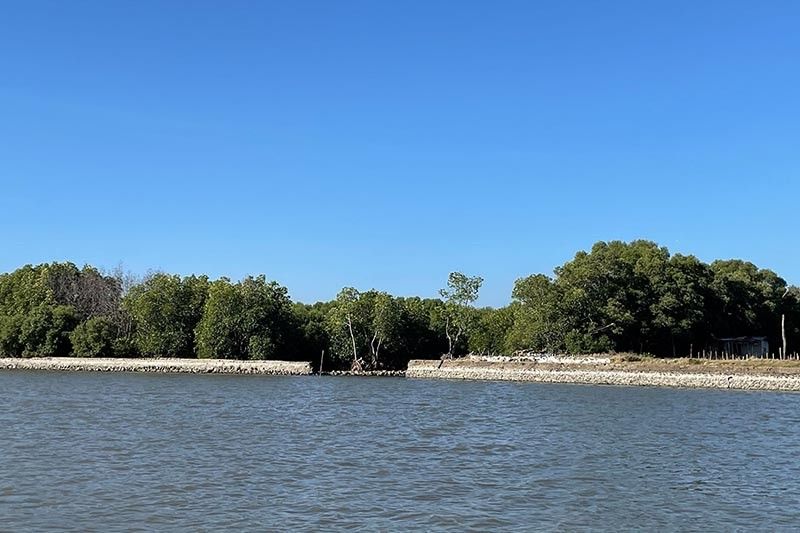Converting ponds to salt farms threatens mangrove restoration, conservationists warn

BATAAN, Philippines — The Philippines is facing a new challenge in its efforts to restore vital mangrove ecosystems: the conversion of fishponds into salt farms.
As the government seeks to revitalize the country's struggling salt industry, conservationists warn that allowing abandoned, undeveloped, and underutilized (AUU) fishponds to be converted into salt farms risks exacerbating the degradation of mangroves.
“Mangroves need brackish water and can hardly survive or grow in conditions that are too high in salinity. So salt farming and mangrove survival are unlikely to co-exist,” said Annadel Cabanban, president of Wetlands International Philippines.
According to Cabanban, excessive water salinity can stunt mangrove growth, reduce biomass and impair photosynthesis. It also makes it difficult for mangroves to absorb water and nutrients, hindering their survival.
“We are already in a race against climate change. If we lose any more mangroves, the more vulnerable our country will be to coastal flooding, erosion, and storm surges,” she said.
Mangroves provide a range of ecosystem services, including coastline protection, carbon storage and sequestration, and provision of habitats for various species. Mangroves also support the livelihood of coastal communities.
Salt farming
Last year, the Senate and the House of Representatives approved a bill outlining measures aimed at reviving the salt industry. It was sent to President Ferdinand Marcos Jr. for his signature in February.
The proposed Philippine Salt Industry Development Act would establish a roadmap with programs and projects for the management, research, modernization, and commercialization of salt.
The measure also allows the use of fishponds for salt farming or production.
“They are targeting abandoned ponds, but not all abandoned ponds qualify because one requirement for a good salt bed is clear water. If you do that, it’s not cost-efficient,” said Jocel Pangilinan, Wetlands International Philippines project manager.
“So after a while, you’ll need to invest a large amount of capital to sustain it because with the significant capital you’re putting out, you’ll just incur huge losses compared to the returns you’ll get,” she added.
Wetlands International Philippines stressed that while some studies suggest that mangrove restoration can still happen in former salt bed areas, this is “costly and tedious” and only allows species that can tolerate high salinity.
From ponds to forests
Instead of using ponds for salt farming, groups like Wetlands International Philippines are calling on the government to fast-track the reversion of AUU fishponds to mangroves.
They also called on the agriculture department’s Bureau of Fisheries and Aquatic Resources to cancel and transfer all fishpond lease agreements (FLAs) for idle and underutilized ponds back to the DENR so the areas can be restored to their original mangrove state.
Philstar.com has reached out to BFAR for comment, but the agency has not yet responded.
More than half of the Philippines’ extensive mangrove ecosystems, estimated at 450,000 hectares in 1918, have been lost primarily to fishpond conversion and other coastal development projects.
According to a University of the Philippines study, mangrove losses in the country were the second worst in the region, next to Myanmar.
Wetlands International Philippines is initiating dialogues with fishpond operators to convert idle areas into mangrove ecosystems.
The organization recommends the implementation of the Associated Mangrove Aquaculture (AMA) approach, which it describes as both “mangrove-friendly and socio-economically viable.”
AMA restores mangrove greenbelts in the estuary along inland waterways and protects adjoining fishponds.
“You allow the hydrology and the sediments to settle again and then the mangroves will naturally settle in the area. Or because of the climate crisis, we're also doing assisted natural regeneration, where you provide the conditions to the area and then establish a nursery and then plant,” Pangilinan said.
According to Wetlands International Philippines, the approach also leverages the ability of mangroves to enhance biodiversity, increasing aquaculture production in a more sustainable manner compared to traditional silvo-fishery systems.
Last month, conservationists, including leading mangrove expert Jurgenne Primavera, criticized the move of BFAR to amend Fisheries Administrative Order 197-1, the rules governing the lease of public land for fishpond and mangrove-friendly aquaculture.
“We found it to be all about fishponds or other aquaculture and nothing in the provisions are friendly to, or supportive of, mangroves,” Primavera said.
Blue carbon
The group also pointed out that mangrove forest rehabilitation in fishponds can be a strategy for increased blue carbon investments.
“This presents a timely opportunity to secure sustainable financing, including access to carbon markets, that conserves critical ecosystems while enhancing livelihoods and resilience,” Cabanban said, urging the government to develop policies for blue carbon investments.
A 2008 study suggested that a 4:1 mangrove-pond ratio is necessary to attain environmental sustainability and maximum economic value from combined mangrove goods, services and uses.
The current mangrove-pond ratio in the Philippines is 1:1, according to Oceana Philippines.
- Latest






























